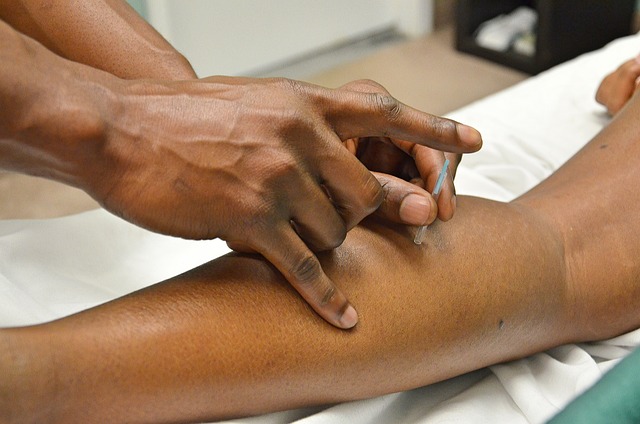Advanced regenerative therapies, including tissue engineering, stem cell therapy (e.g., mesenchymal stem cells), platelet-rich plasma (PRP), and gene therapy, offer novel solutions for managing chronic pain and a range of conditions by leveraging the body's inherent healing capabilities. PRP, using a patient's own blood, is popular for chronic pain, sports injuries, and aesthetic procedures. Cell therapy, particularly with MSCs, targets inflammation and regenerates damaged nerves, providing long-lasting relief. Stem cell and PRP therapies show promise in treating various conditions from sports injuries to degenerative diseases. Integrating these advanced therapies into healthcare requires collaboration among professionals, specialized training, adequate infrastructure, robust clinical trials, and meticulous data analysis for safety and efficacy.
“Discover the revolutionary world of advanced therapies transforming regenerative healing and recovery. From targeting chronic pain with a comprehensive approach to exploring cell therapy’s potential in tissue repair, this article delves into cutting-edge treatments. We examine emerging techniques accelerating recovery and discuss integration into healthcare systems for optimal patient care. Uncover how these innovative strategies are redefining chronic pain management and setting new standards in medical advancements.”
- Understanding Advanced Therapies for Regenerative Healing
- Targeting Chronic Pain: A Comprehensive Approach
- Cell Therapy and Its Role in Tissue Repair
- Emerging Techniques for Accelerated Recovery
- Integrating Advanced Therapies into Healthcare Systems
Understanding Advanced Therapies for Regenerative Healing

Advanced therapies for regenerative healing represent a groundbreaking approach in healthcare, offering new hope for managing and treating various conditions, including chronic pain. These innovative treatments go beyond traditional medicine by harnessing the body’s natural ability to heal and regenerate itself. By stimulating cellular repair mechanisms, these therapies aim to restore function and alleviate symptoms associated with a wide range of injuries and diseases.
One key aspect of advanced regenerative therapies is their versatility in targeting different medical needs. From tissue engineering and stem cell therapy to platelet-rich plasma (PRP) and gene therapy, each method utilizes specific biological components to accelerate the healing process. For instance, PRP involves extracting a patient’s own blood and utilizing its growth factors to promote tissue regeneration, making it a popular choice for chronic pain management, sports injuries, and aesthetic procedures. Understanding these advanced therapies is crucial in navigating modern healthcare solutions and discovering new paths towards effective recovery.
Targeting Chronic Pain: A Comprehensive Approach

Chronic pain, often a complex and persistent issue, requires a comprehensive approach for effective management. Advanced therapies offer promising solutions by targeting not just the symptoms but also the underlying causes. Techniques such as platelet-rich plasma (PRP) therapy and mesenchymal stem cell (MSC) therapy have gained traction in chronic pain treatment.
These innovative methods harness the body’s natural healing mechanisms to promote tissue regeneration and reduce inflammation, providing a more holistic approach to chronic pain management. By addressing the root causes of pain, these advanced therapies offer long-term relief and improved quality of life for patients suffering from chronic conditions.
Cell Therapy and Its Role in Tissue Repair

Cell therapy represents a groundbreaking advancement in regenerative medicine, offering new hope for tissue repair and recovery. This innovative approach leverages the body’s own cells to stimulate healing, particularly focusing on damaged or degenerated tissues. By introducing specialized cells directly into affected areas, cell therapy can accelerate the natural healing process and promote tissue regeneration.
In the context of chronic pain management, cell therapy has shown significant potential. For instance, mesenchymal stem cells (MSCs) have been used to target inflammation and repair damaged nerves, offering relief from persistent pain conditions. MSCs possess the unique ability to differentiate into various cell types, such as neurons or fibroblasts, which are crucial for regenerating nerve tissue and promoting healing in chronic pain patients. This targeted approach has the capacity to transform the way we manage and treat chronic pain, providing long-lasting benefits and improved quality of life for those suffering from these conditions.
Emerging Techniques for Accelerated Recovery

In the realm of advanced therapies, emerging techniques are revolutionizing regenerative healing and recovery, particularly in the management of chronic pain. One notable game changer is the application of stem cell therapy, which harnesses the body’s natural ability to regenerate and repair damaged tissues. This innovative approach has shown promising results in treating various conditions, from sports injuries to degenerative diseases, by accelerating the body’s natural healing process.
Additionally, technologies such as platelet-rich plasma (PRP) therapy are gaining traction for their potential to stimulate tissue regeneration and reduce inflammation. PRP, enriched with growth factors, is injected into injured areas to promote faster recovery, particularly in muscle strains, tendonitis, and joint pain. These cutting-edge methods offer hope for those seeking effective chronic pain management, providing alternative solutions beyond traditional medication and surgery.
Integrating Advanced Therapies into Healthcare Systems

Integrating advanced therapies into healthcare systems represents a significant shift towards personalized and effective treatments for various conditions, including chronic pain management. These innovative approaches, such as cell therapy, gene therapy, and tissue engineering, offer unprecedented potential to regenerate damaged tissues and accelerate healing processes. By embracing these advancements, healthcare providers can enhance patient outcomes and improve quality of life for those suffering from debilitating chronic pain.
Effective integration requires collaboration between medical professionals, researchers, and policymakers. Healthcare systems must adapt to accommodate the specialized training and infrastructure needed for advanced therapy administration. Additionally, robust clinical trials and data analysis are essential to validate their safety and efficacy, ensuring these therapies become reliable components of standard care for chronic pain management and other regenerative healing applications.
Advanced therapies, encompassing cell therapy, tissue engineering, and novel delivery systems, offer transformative potential in regenerative healing and chronic pain management. By harnessing the body’s inherent capacity for self-repair, these innovative approaches aim to revolutionize healthcare, providing more effective and personalized treatment options. As research continues to advance, integrating these cutting-edge therapies into healthcare systems will be crucial, promising improved outcomes and enhanced quality of life for patients suffering from various conditions, particularly in chronic pain management.
